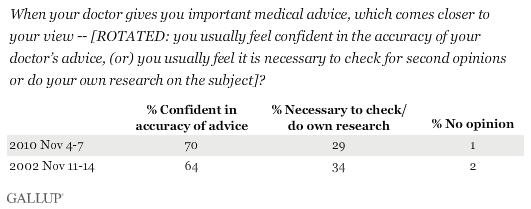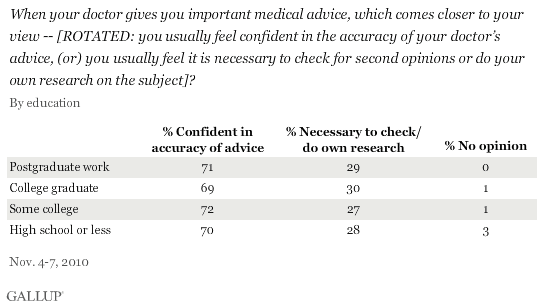PRINCETON, NJ -- Despite the advent of health websites and other widely available sources providing medical research and information, 70% of Americans feel confident in the accuracy of their doctor's advice, and don't feel the need to check for a second opinion or do additional research. Americans' confidence in their doctor is up slightly from eight years ago.

The latest results are from Gallup's annual Health and Healthcare Survey, conducted Nov. 4-7, 2010.
Older Americans are the most likely to be confident in their doctor's advice, with 85% of those 65 and older expressing confidence. This compares with 67% among those 50 to 64 and 65% among those under 50.
While one might expect that interest in a second opinion and doing additional research would be higher among Americans with college degrees or postgraduate education, that is not the case. There is little difference in confidence in one's doctor across the educational spectrum.

Implications
The advent of health websites and other sources of health information have made it easier than in the past to seek additional medical information about a diagnosis or medical recommendation. Some insurance plans encourage or require second opinions before authorizing procedures. News media, magazines, and television programs increasingly focus on, and in many instances question, medical and health conditions and their remedies. The efficacy of common medical procedures such as mammograms, PSA tests, Vitamin D, and back surgery have been questioned in recent years. One might have expected all of these circumstances to increase the interest of average Americans in validating their doctor's advice. But that has not occurred.
This may in part reflect Americans' continuing high level of confidence in the honesty and ethics of doctors, which has not changed significantly over the past eight years. In Gallup's annual survey of the perceived honesty and ethics of professions, Americans' confidence in doctors remains at roughly the same level now as it was in 2002 -- near, but not at the top of the list of professions tested. (Gallup released the complete results of this year's honesty and ethics ratings of professions on Friday, Dec. 3.)
All in all, these data suggest that doctors generally are in at least as good a position in their patients' minds as they were eight years ago. This is despite anecdotal reports of doctors' complaints about patients' second-guessing their diagnoses and medical advice, and spending hours on the Internet researching what they have been told. The substantial majority of Americans seem content to generally accept their doctor's advice without need for further research or a second opinion.
Survey Methods
Results for this Gallup poll are based on telephone interviews conducted Nov. 4-7, 2010, with a random sample of 511 adults, aged 18 and older, living in the continental U.S., selected using random-digit-dial sampling.
For results based on the total sample of national adults, one can say with 95% confidence that the maximum margin of sampling error is ±5 percentage points.
Interviews are conducted with respondents on landline telephones (for respondents with a landline telephone) and cellular phones (for respondents who are cell phone-only). Each sample includes a minimum quota of 150 cell phone-only respondents and 850 landline respondents, with additional minimum quotas among landline respondents for gender within region. Landline respondents are chosen at random within each household on the basis of which member had the most recent birthday.
Samples are weighted by gender, age, race, education, region, and phone lines. Demographic weighting targets are based on the March 2009 Current Population Survey figures for the aged 18 and older non-institutionalized population living in continental U.S. telephone households. All reported margins of sampling error include the computed design effects for weighting and sample design.
In addition to sampling error, question wording and practical difficulties in conducting surveys can introduce error or bias into the findings of public opinion polls.
View methodology, full question results, and trend data.
For more details on Gallup's polling methodology, visit www.gallup.com.
